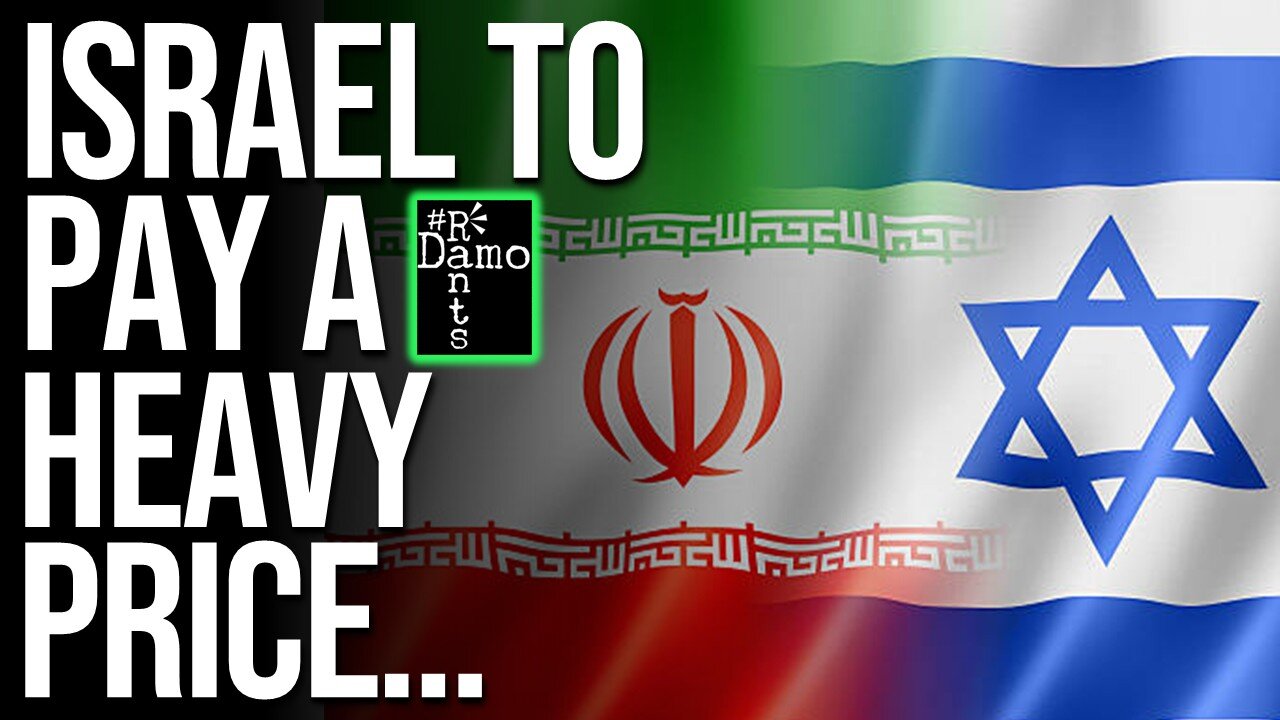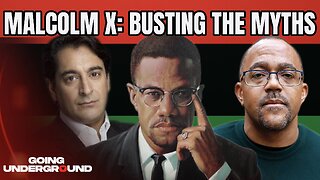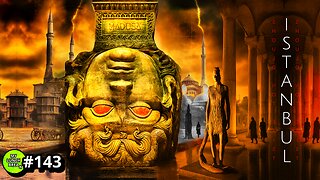Premium Only Content

Netanyahu’s Government Imploding – And Iran’s Got The Popcorn
Right, so for those of us who reported on and created a lot of content in relation to the unprovoked Israeli attack on Iran last month have come a lot of accusations of bias, usually from Zionists, so there’s certainly an argument for why we should take no notice of them, especially given the circumstances detailed Iran’s right to defend itself. But I thought to myself, if, on one hand regime change in Israel is a necessary first step, if Netanyahu’s downfall is essential, should I not examine the same line of questioning versus Iran too? On one side, Iran’s theocracy have a track record for atrocities too, executing protesters and jailing journalists. On the other, we have Israel’s ultra-nationalist coalition, bombing hospitals in Gaza, annexing the West Bank, and picking fights with half the region while waving a democracy badge like a forged passport. Both regimes it can be argued are crisis factories in light of that, but that still doesn’t detract from the fact that only one is killing thousands by the week, igniting regional warfronts like matches, and still getting invited to Western summits.
So I thought to myself, well, lets have a bit of devils advocacy here, Israel vs Iran, but the more I thought about it, the question wasn’t so much just who falls first—if either of them—it’s who needs to fall and who is likely to and its bad news for Netanyahu on both fronts, not just because of my own personal feelings, but based on the evidence I’ve found as well and arguably its that conflict with Iran that exposes his desperation and precarious position the most.
Right, so when a government is live-streaming a genocide, destabilising shipping lanes, screaming that the opposition are 5 minutes away from a nuclear weapon, and gutting its own democracy while lecturing the world on ethics, perhaps it’s time to adjust the regime change priority list here. Western powers are determined Iran must fall, but they’re pro Israel, so they would. That doesn’t exonerate Iran from domestic violence itself, it does have an appalling track record of execute protesters and journalists, using the death penalty to clamp down on dissent, so for as much as we might be challenged for what I maintain as righteous and unflinching condemnation of Israel for its genocide of Gaza and other atrocities, Iran is not above reproach either, so if people are going to scream regime change is needed against one or the other and especially in light of Zionist defences of Israel which offend me viscerally, I thought I’d take a look at this and I feel fairly vindicated in my findings, because there is no doubt that Israel’s fall would do more to save lives, calm the region, and shake loose decades of double standards than any revolution in Tehran would, and though no doubt I’ll still be accused of bias, I fancy somebody needed to say this and you might get some anti-Zionist talking points out of it too, whilst not overtly aligning with another state that certainly does have issues it needs to address and answer for as well.
So the Middle East is fundamentally caught in the throes of two interconnected crises, each driven by regimes facing deep internal dissent and mounting external pressure, that is I think perfectly fair to say. Israel’s far-right government under Benjamin Netanyahu and Iran’s clerical theocracy led by Ayatollah Ali Khamenei. Both are in crisis, but in profoundly different ways. Israel stands accused of genocide in Gaza, mass land theft in the West Bank, and reckless military aggression across the region, including towards Iran. I completely agree with that, I think ample evidence exists to back that up. Iran, meanwhile, suppresses protests at home with brutal crackdowns, mass arrests, and executions, while positioning itself regionally as a reactive power rather than an expansionist aggressor. Evidence exists for all of that too. Now much of the global debate surrounding these two states and their futures, we can simply ask about whether or not these regimes survive, its an often asked question, its often the framing of much media output on the subject, but I think its better to be asking a much harder question, reframe this narrative a bit: if regime change is inevitable or even necessary, which should come first for the greater good of the Middle East then? Surely that is what cuts to the core of what we all want to see and that is peace and stability across the Middle East.
This question is not merely academic speculation. It is a moral and strategic imperative because the consequences of regime change—whether in Tehran or Tel Aviv—would reverberate far beyond national borders. If Israel’s far-right coalition fell tomorrow, would it end the genocide in Gaza and de-escalate conflicts in Lebanon and Yemen? If Iran’s theocracy collapsed first, would that bring freedom to its citizens, or would it instead embolden Israeli aggression and risk plunging Iran into chaos akin to Libya or Iraq after Western-backed interventions? When you drill down into this, these are not simply hypotheticals, they become matters of life and death, shaping whether hundreds of thousands live or perish.
While Iran’s repressive theocracy deserves to be held to account for its abuses, the urgency of saving tens of thousands of lives in Gaza and halting the spread of regional war outweighs Iran’s domestic oppression. Israel’s government is a key driver of regional instability and mass displacement, while Iran’s military actions remain primarily reactive, they only got involved when Israel attacked them. Removing Netanyahu’s far right coalition would de-escalate multiple war fronts simultaneously, ease tensions between Arab states and Israel, and potentially force a fundamental shift in Western policy towards the region. Iran’s fall, by contrast, carries far greater risks of internal collapse, further regional destabilisation, and unintended empowerment of Israel’s most hardline factions, whilst opening the way to Western control of Iran, via the probable imposition of a new Shah.
So the first and most pressing argument for prioritising Israeli regime change lies in Gaza, where Israel is committing what Amnesty International and Human Rights Watch now unambiguously call genocide. Amnesty concludes that Israel’s campaign constitutes “deliberate and systematic destruction of civilian life and infrastructure,” and Human Rights Watch describes the extermination of Gaza’s population as “acts of genocide” under international law. UN human rights experts have warned that Israel is deliberately using starvation as a weapon, with children dying of malnutrition and famine conditions now widespread. According to UN data, one person in Gaza is being killed every twelve minutes.
The human toll is staggering. Over 58,500 Palestinians have been killed, according to updated figures cited by UN agencies and human rights organisations, while tens of thousands more are permanently maimed. Eighty percent of Gaza’s population is displaced, with entire neighbourhoods reduced to rubble. Hospitals, schools, and refugee camps have been repeatedly targeted in what international experts increasingly describe as a campaign of mass extermination rather than military necessity. Israel is attempting to erase a people in full view of the international community, while global powers largely refuse to intervene.
The Gaza genocide is not confined in its consequences to Gaza itself either. It has radicalised populations across the Middle East and civil unrest has erupted from Cairo to Amman. Egypt’s regime faces mounting unrest over its role in keeping the Rafah border closed, fuelling accusations that President Abdel Fattah el-Sisi is complicit in Israel’s starvation tactics. Jordan’s monarchy faces growing protests demanding the cancellation of its peace treaty with Israel. Perhaps most significantly, the genocide has energised regional militias, giving groups such as Hezbollah, the Houthis, and Iraqi militias renewed legitimacy as “defenders of Gaza.” The longer the genocide continues, the more it entrenches cycles of resistance and retaliation across the region.
The situation in the West Bank adds further weight to the case for Israeli regime change. While Gaza dominates headlines, Israel’s foul far right government is simultaneously accelerating land theft and settlement expansion on a scale unprecedented in recent years. The European External Action Service reports that 2023 saw the highest rate of settlement expansion since 2012, with 30,600 housing units advanced in occupied territory. In May 2025, Israel legalised 22 new settlements in the West Bank, defying international law and further entrenching its occupation. Organisations such as B’Tselem now estimate that over 620,000 settlers reside illegally in occupied Palestinian territories. These actions are not only violations of international law but are also deliberate attempts to make a viable Palestinian state impossible. Ministers like Bezalel Smotrich and Itamar Ben-Gvir openly advocate annexation and mass displacement, policies that amount to a slow-motion ethnic cleansing of Palestinians.
Israel’s actions are not even confined to the Occupied Palestinian territories though. Its policies are destabilising the entire region through multiple war fronts. In Lebanon and Syria, cross-border clashes with Hezbollah and the new HTS led administration have escalated to their highest level since the 2006 war. In Iran, Netanyahu’s government has launched strikes on nuclear facilities, risking significant and further regional war is possible, we know Netanyahu wants to start again. Tehran’s measured retaliation to that was notable for its restraint, targeting military rather than civilian infrastructure. In Yemen, the Houthis have blockaded Israeli-linked shipping in the Red Sea, disrupting global trade as a direct response to the Gaza war. These conflicts are interconnected, and regime change in Israel could de-escalate them all simultaneously. Ending the genocide in Gaza would remove the primary grievance driving regional militancy, making it harder for groups like the Houthis to justify continued attacks.
Israel’s internal political crisis further strengthens the case for prioritising its regime change. Unlike Iran, Israel retains functioning electoral mechanisms and a significant tradition of political dissent. Netanyahu’s judicial overhaul, which sought to weaken the Supreme Court’s ability to check executive power, has sparked the largest protests in Israel’s history. Hundreds of thousands of Israelis, including military reservists and former security chiefs, have joined demonstrations. Legal experts and former intelligence officials have warned that the reforms threaten Israel’s democracy and national security. The feasibility of regime change is therefore much higher in Israel than in Iran. Netanyahu’s coalition is fragile, more so now than ever as he now has a minority administration and dissent continues to grow, creating realistic prospects for a political transition in the near future.
Iran’s regime is undeniably oppressive. Following the Mahsa Amini protests, thousands of Iranians were arrested, and executions surged to nearly 1,000 in 2024 alone. The Washington Post has described this wave of executions as “mass state terror,” and Reuters reports that while the protests have been suppressed, popular dissatisfaction remains high. Polling data from the GAMAAN research group confirms that most Iranians want a secular state and oppose mandatory hijab laws. However, regime change in Iran is unlikely to succeed unless driven by cohesive internal opposition, and externally imposed regime change would almost certainly fail or backfire, look at how quickly many around the world rallied to Iran’s side against Israel as they attacked, yet we’re supposed to support Israel against global boogeyman Iran aren’t we? Its not cutting through anymore when we can see the truth before our eyes across social media.
Iran’s regional role also differs fundamentally from Israel’s. While Tehran funds militias and supports groups such as Hezbollah, its military actions are largely reactive. When Hezbollah or the Houthis attacked Israel, these actions were directly linked to Israel’s genocide of Gaza rather than to any independent Iranian expansionist agenda. Even Iran’s missile strikes on Israel in last month were carefully calibrated to target military rather than civilian infrastructure where possible, because of course Israel build much of their military infrastructure in civilian areas. Removing Iran’s regime might weaken its proxies, if indeed the proxy argument is even valid, the Houthis would dispute it, but it would not address the root cause of their mobilisation: Israel’s aggression and occupation policies.
The risks of sudden regime collapse in Iran – the likelihood of that happening aside for a moment - are considerable. A study on the long-term economic and political effects of regime upheavals, published on arXiv by Cornell University, warns that revolutions often lead to decades of instability. Iran’s own history after 1979 serves as a cautionary tale, and a new collapse could fragment the country, empower hardline nationalist factions, or trigger a prolonged civil war. Or indeed Western powers could move in and impose a new puppet leader, a new Shah, goodness the son of the last one very much wants this to happen, but he’s largely a fringe figure right now, speaking to the likelihood of regime change in actuality. Moreover, removing Iran as a regional counterweight would undoubtedly embolden Israel and the United States, potentially worsening the plight of Palestinians. Why else is Netanyahu so determined to take Iran out? He knows they have no nuclear weapons, the IAEA knows it, they are signatories to the NPT, Israel have the secret or not so secret stash of nukes, not Iran.
When comparing the two regimes, the humanitarian perspective should obviously be what takes precedent. Israel is committing genocide in real time. Its fall could end mass killings, starvation, and displacement within months. Iran’s repression is brutal but largely contained within its own borders, and while regime change might eventually improve life for Iranians, it would not save lives in the immediate term.
Regional stability also hinges more on Israel than Iran. Israeli regime change would ease tensions in Gaza, Lebanon, Yemen, and even Iran, reducing the likelihood of a wider regional war. Iran’s fall, by contrast, could destabilise the region further, creating power vacuums and strengthening Western and Israeli hardliners. The feasibility of regime change is another critical factor. Israel’s democratic institutions and growing elite dissent make peaceful political transition possible. Iran’s entrenched theocracy and the Revolutionary Guards’ grip on power make any change likely to be violent and destabilising.
Finally, the global consequences of each scenario must be considered too. Israeli regime change could force a fundamental shift in Western policy, weakening the influence of hardline Zionist lobbies and encouraging a more balanced diplomatic approach. Iranian regime change, however, could strengthen US-Israeli hegemony and embolden further Israeli expansionism and lobbying.
Both Israel and Iran deserve to face accountability for their abuses. But the greater good demands prioritising the regime actively committing mass slaughter over the one repressing its own citizens. Netanyahu’s coalition is genocidal, expansionist, and destabilising the region on multiple fronts. Its fall would save lives immediately and open the door to a more stable Middle East. As UN human rights experts have warned, the world faces a choice: act to “end the unfolding genocide or watch it end life in Gaza.” Iran’s regime change may one day be necessary for the Iranian people’s freedom, but in the calculus of humanitarian urgency, regional stability, and practical feasibility, which ultimately is what people are focused on in the aftermath of the 12 day conflict between the two states, Israel’s regime change – again, if either are to actually happen - clearly must come first. Zionists are welcome to try and refute that now if they can.
What do you reckon though? Agree or disagree? Tell me why in the comments below.
Meanwhile, Israel keeps reminding us of its repression all the more, its clampdown on aid even as it supposedly allows aid drops from the skies, they aren’t permitting baby formula by boat, as the crew of the latest Freedom Flotilla Coalition mission have now been seized and taken into Israeli custody, again in international waters, so an act of piracy just as we saw with the Madleen before it. Get all the details of that story in this video recommendation here as your suggested next watch.
Please do also hit like, share and subscribe if you haven’t done so already so as to ensure you don’t miss out on all new daily content as well as spreading the word and helping to support the channel at the same time which is very much appreciated, holding power to account for ordinary working class people and I will hopefully catch you on the next vid. Cheers folks.
-
 29:09
29:09
Afshin Rattansi's Going Underground
1 day agoThe Political Life of Malcolm X: Busting the Myths (Prof. Kehinde Andrews)
4.62K12 -
 LIVE
LIVE
DLDAfterDark
2 hours agoThe Assassination of Charlie Kirk - Just What We KNOW
123 watching -
 1:33:56
1:33:56
MattMorseTV
3 hours ago $23.17 earned🔴Exposing his PARTNER IN CRIME.🔴
45K177 -
 1:26:51
1:26:51
vivafrei
7 hours agoCharlie Kirk Assassination - When Peaceful Discussion Becomes Impossible - With Jose Vege
71.6K160 -
 2:04:12
2:04:12
Mally_Mouse
23 hours ago🌶️ 🥵Spicy BITE Saturday!! 🥵🌶️- Let's Play: Supermarket Together
32.7K2 -
 1:15:37
1:15:37
BooniesHQ
7 hours ago $6.63 earnedGame Of SKATE Donny Hixson Vs. Chris Massie: Boonies Skate Night 2
54.1K7 -
 2:56:25
2:56:25
Barry Cunningham
8 hours agoTHE TAKING OF CHARLIE KIRK HAS IGNITED A FLAME! AND A BREAKING (BUT NOT SHOCKING) UPDATE!
104K109 -
 9:38
9:38
Exploring With Nug
11 hours ago $2.76 earnedSearching Florida Waters for a Missing Murder Victim’s Car | Alligator Encounter!
37.7K1 -
 2:05:59
2:05:59
SavageJayGatsby
23 hours agoSpicy Bite Saturday | Let's Play: Supermarket Together
33.6K -
 23:23
23:23
MYLUNCHBREAK CHANNEL PAGE
1 day agoIstanbul Should Not Exist - Pt 1
64.5K30